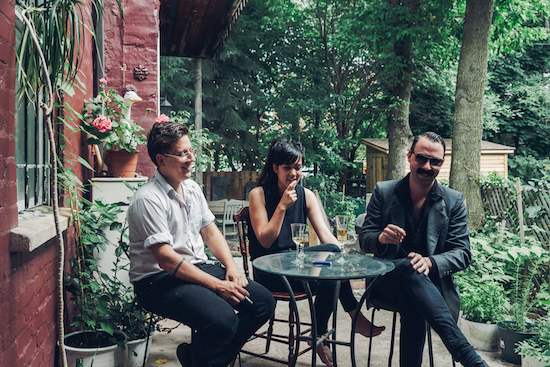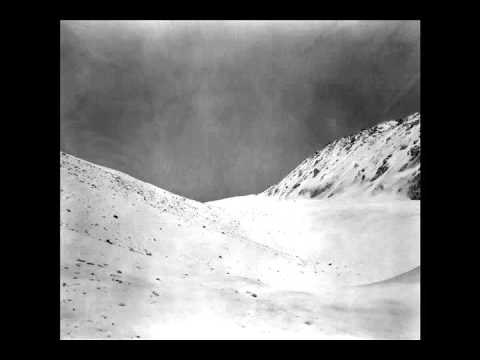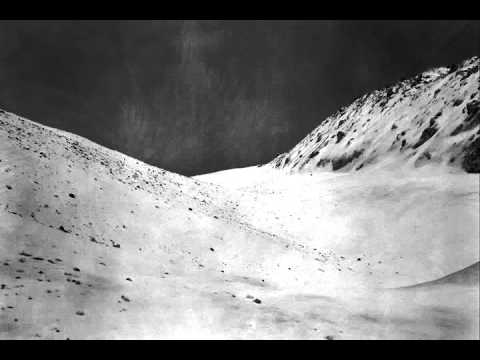Photograph courtesy of Lisa Griffiths
Au De La, the new album from Big | Brave, often sounds like a band damn well grappling with its gear. Two guitarists crafting feedback into melodies, yearning and aching to get those explosive feelings out. One drummer crashing and falling into his kit, expelling broad strokes of wrath into sketched beats. One voice twisting its words into ritual yelps and bewitching tunes. With the aim of forging a brutal sort of noise, and with a songbook of rituals built around the druidic vocalisations of Robin Wattie, Big | Brave put death metal bursts of energy into every moment of their sprawling epics, from the pindrop whispers of droning guitar strings at the beginning of the 12-minute ‘Look At How The World Has Made A Change’ to the carpet bombing of riffs and screams that open the album on ‘On The By And By And Thereon’. Possible descriptive references are both scattered and contradictory – the spacious melodic metal tendencies feel like the modern-day incarnation of Southern Lord labelmates Earth, the chasms of emotion recall the output on fellow Montreal residents Constellation Records, even the jagged edges of Shellac’s sheer brute force are present – but it all adds up to the same thing. This is guitar music extra wide in scope and utterly abrasive in its execution.
The band’s home city provided the space for Big | Brave to organically spend the last three years or so playing together, toying with their sonic frameworks. "Nothing is too weird here," explains guitarist Mathieu Bernard Ball. "You can do pretty much do anything you want and you will most likely find an audience or other people who have similar interests."
It also provided three essential collaborators on Au De La, in the form of Jessica Moss of Silver Mt. Zion and Black Ox Orkestar adding impeccable violin to several tracks, Godspeed You! Black Emperor and SMZ’s Efrim Menuck behind the mixing desk at Hotel2Tango and the crystal clear dynamics of mastering engineer, Harris Newman. All mesh with the bassless guitar trio (two electric guitars and one drummer), who manage to edge their noise into every corner of the audio field, burning up the low end with warm, hefty waves of riffage laying a dense groundwork for Wattie’s anguished voice. Other sections see drummer Louis-Alexandre Beauregard lead the way unassisted into vast, vacant spaces of nocturnal near-silence.
The band’s skeleton was relatively well formed on their debut full-length of briefer tracks, Feral Verdure, released last year, but it all falls into place on Au De La. Darkness and desperation reach new heights in 13-minute closer ‘(re)Collection Part II’ as it swells from crunching, stoned desert riffs into a throbbing, bobbing ocean of feeding-back strings, amplifier noise and chanted requiem incantations. Ahead of some upcoming tour dates in Europe, we spoke to Bernard Ball about the trio’s inward journey to Au De La.
What are some of your favourite lyrics from the album? Robin’s singing style is incredibly powerful, twisting words and sounds beautifully into strange new shapes.
Mathieu Bernard Ball: The lyrics are pretty abstract. Getting a detailed message across with the lyrics is definitely not a priority. When lyrics are ambiguous, they remain open for interpretation. Words, speech patterns and sentences; although mostly used to depict specific thoughts and ideas, in this case, are very much utilised for their sound. Robin’s voice is very much another instrument in the band. Her vocal patterns are never the last thing to be added to the songs. In fact, the vocal patterns she creates often give songs their direction and heavily influence their outcome.
Vocals can have the power to evoke certain emotions even when it is not clear what is being said. It’s like listening to music in a foreign language you don’t understand. You may have no idea what is being said literally but that never diminishes the power of the human voice. As one thing that is surely recognisable when you hear vocals in music is the fact that these sounds come from within the human body – it’s very physical and relatable.
There’s a vast array of different musical strands running through these songs. I hear Sandy Denny and Fairport Convention in some sections on ‘And As The Waters Go’, Sonic Youth in others and long-form stoner metal on ‘(re)Collection Part II’. Who were some of the main influences you took into consideration while recording Au De La?
MBB: Being enthusiasts of so many different kinds of music and having been listening to music for the vast majority of our lives, I truly believe that everything that has entered our ears has had an influence on this record. It may sound cheesy, but I do believe that our brains are blenders. Everything and anything you consume aurally shapes the way you make music and think about music.
When we started making music together, we wrote very quiet, minimal folk music. Over the years, we’ve slowly but progressively transformed into the band we are now. From the inception of the band, if we had latched onto any main influences, we would have never gotten to the point we are now at. With some of the new music we are working on, I can already see an evolution from Au De La. As I am really proud of this record, I see it as only a segment of something greater I would like to achieve with this band.
So how did things get much louder like they are on this record? It is often a bit closer to metal than to folk – or perhaps it’s right in between?
MBB: We never really intended to be a loud band. It’s not like we suddenly one day decided to ditch our acoustic instruments, get distortion pedals and buy bigger amps. From our early attempts at writing music together to the stuff we are writing now, it’s been a pretty steady transition. It may only be around three years since we’ve started this, but when you work and think about something every day, ideas develop, perspectives change. A lot can happen in 1,000 days.
From our first EP [2013’s self-released An Understanding Between People] to Au De La, we pretty much just focused on things that we were more sonically interested in, while constantly eliminating what we did not find as stimulating. We simply started experimenting with elements such as amplitude, repetition, dynamics and feedback – to name a few – and kept exploring until we stumbled upon something that really spoke to us. Time spent on making art is pretty crucial.
You play as a trio without a bass guitar – was it much of a conscious decision to keep at it without one? You do very well at making a large sound without one…
MBB: Robin and I had been playing together for a few years before Louis [drums] joined us. When we started playing as a trio, in its beginnings [it was] still very quiet and minimal, I don’t even think we thought of getting a bass player. It just didn’t seem necessary to be adding another person to the equation. As we started to experiment with amplitude, still not wanting to add another member to the band, we found other ways to get low end. As many bands form with a specific idea of which instruments they wish to include, we simply played the hand we were dealt and used the tools we had at our disposal.
You appear to credit the guitar players in the band as playing amplifiers as well. What do you think you mean by this?
MBB: When you play at loud levels and utilise feedback the way Robin and I do, the amps become such an important part of your sound. I mean, an amp is always an important part of one’s sound, but for us, they do much more than sit back there and reproduce what the pick-ups on the guitar register from the vibrating strings. They have a very engaged role in the sounds we are able to produce. The usual relationship between an amp and its player is pretty linear: the musician plays something on his instrument and that something comes out amplified. With our utilisation of loud levels and feedback, the relationship between our guitars and our amps is much more circular. It’s the whole feedback loop thing. What you play on your guitar comes out of the amp which is then again picked up by guitar to again come out of the amp. You get to know your amp the way you know your guitar.
With feedback, certain things you do on a guitar can sound amazing and other things can come out sounding pretty terrible. With this constant pursuit of ‘good’ feedback, the difference between this desired feedback tone and an undesired feedback tone may also come down to the angle at which you are facing the amp. The relationship with the amp physically involves your body, as you are dancing with the amp and your guitar in order to get that desired sound. In the end, you are playing with the amp just as much as you are with the guitar.
To what extent do you see your shows as a performance? There’s a ritual feeling to some of your music, which is brutally honest in a way. Like an emotional exorcism… do you find playing this music to be ‘truthful’?
MBB: Many people have mentioned to us that our music seems to be honest. And all I can really say is that it is. We come up with a lot of our music based on ideas or concepts we may have, but another really important factor here is where the music we make comes from emotionally. A lot of unexplainable feeling goes into our songwriting and live performance. And I believe that that’s what people connect with. All truth, no lies.
You’re about to head off on tour around Europe. Is that your first time playing over here? What are your hopes and fears for the tour?
MBB: I cannot put into words how excited I am for this first European tour. We are beyond lucky to be able to do this. Quite the privilege. I am excited about the whole goddamn thing but really excited to be able to spend a few days at Le Guess Who? festival in Utrecht. The line-up is beyond amazing. We also get to spend some few days at ATP in Prestatyn which is great. Going on tour is always really great but you move from city to city so quickly that you don’t really get time to enjoy this new place you’re visiting for the first time. It’s worked out pretty well that around both festival stops on this tour we’ll have a few days off.
Fears? Having to drive on the ‘wrong’ side of the road…
Au De La is out now on Southern Lord. Big | Brave start a European tour at Gleis 22
in Munster, Germany on November 19, with UK dates beginning at Birthdays in London on November 25; for full details and tickets, head here





